Win?
Ah, so this is effectively identical to Apple's approach to repairability.
I find it difficult to know if my flight will avoid 737 Max, so I've been avoiding airlines that have them in their fleet. Unfortunately, British Airways recently rebooked me onto an Alaska Airlines, and sure enough, it was a Max 8. Sometimes you just can't win.
Credit can be given to the excellent safety culture, but also the safety mechanisms of the A359: while only three evacuation slides could be used, these slides remained inflated and illuminated well after the evacuation completed and most of the fuselage was a raging inferno. Furthermore, the carbon fiber body held strong despite the impact and well into the subsequent blaze.
I believe there still remains an opportunity to improve, as the evacuation was only completed 18 minutes after the collision. JAL can consider themselves extremely fortunate that the cabin was not more severely affected by smoke.
I have provided sources for this in my detailed write-up on the incident.
Last updated Jan 2, 11:20 UTC; this post is superseded here
JAL flight 516 (registration JA13XJ) Airbus A350-900 from Sapporo to Tokyo’s Haneda Airport collided while landing with a coast guard aircraft JA722A De Havilland Canada DHC-8-315Q MPA "Dash-8" that belonged to Haneda Air Base, which was awaiting departure to Niigata with aid following the New Year's Day Earthquake.
All 367 passengers and 12 crew members escaped the passenger plane, while five people on the coast guard plane were still unaccounted for, NHK reported.
The pilot of the coast guard aircraft had evacuated and contacted officials.
CNN reports that 17 passengers on board JAL516 were injured.
A later press statement from Japan Airlines SVP Noriyuki Aoki clarified that "only four" passengers went to hospital for "feeling unwell," of which two for smoke inhalation, while the pilots are now being interviewed about the final moments of the flight. Eight children were among the 367 passengers.
Regarding JA722A, CNN reports:
Five crew members died on the second aircraft, a De Havilland Canada DHC-8, according to Japan’s transport minister, Tetsuo Saito. Public broadcaster NHK said the plane’s captain was in a critical condition.
Airbus has also issued a statement that a team of Airbus investigators are joining the French BEA and Japanese JTSB.
Last updated Jan 2, 11:20 UTC; this post is superseded here
JAL flight 516 (registration JA13XJ) Airbus A350-900 from Sapporo to Tokyo’s Haneda Airport collided while landing with a coast guard aircraft JA722A De Havilland Canada DHC-8-315Q MPA "Dash-8" that belonged to Haneda Air Base, which was awaiting departure to Niigata with aid following the New Year's Day Earthquake.
All 367 passengers and 12 crew members escaped the passenger plane, while five people on the coast guard plane were still unaccounted for, NHK reported.
The pilot of the coast guard aircraft had evacuated and contacted officials.
CNN reports that 17 passengers on board JAL516 were injured.
A later press statement from Japan Airlines SVP Noriyuki Aoki clarified that "only four" passengers went to hospital for "feeling unwell," of which two for smoke inhalation, while the pilots are now being interviewed about the final moments of the flight. Eight children were among the 367 passengers.
Regarding JA722A, CNN reports:
Five crew members died on the second aircraft, a De Havilland Canada DHC-8, according to Japan’s transport minister, Tetsuo Saito. Public broadcaster NHK said the plane’s captain was in a critical condition.
Airbus has also issued a statement that a team of Airbus investigators are joining the French BEA and Japanese JTSB.
Last edited Jan 4, 12:25 UTC
Japan Airlines flight 516 (JAL516, registration JA13XJ) Airbus A350-900 from Sapporo to Tokyo’s Haneda Airport collided while landing with a coast guard aircraft JA722A De Havilland Canada DHC-8-315Q MPA "Dash-8" that belonged to Haneda Air Base, which was awaiting departure to Niigata with aid following the New Year's Day Earthquake.
All 367 passengers (including 8 children) and 12 crew members safely evacuated JAL516 after it stopped in the grass adjacent runway 34R. [1] Japan Airlines SVP Noriyuki Aoki clarified in a press statement that of the 14 injuries, "only four" passengers went to hospital for "feeling unwell," of which two for smoke inhalation. [2] The aircraft's nose gear collapsed and engines and wings were engulfed in flames immediately following the collision.
Of the six crew members on board JA722A, 5 crew members died in the collision or resulting fire, according to Japan’s transport minister Tetsuo Saito. Public broadcaster NHK said the plane’s captain was in a critical condition. [1]
The immediate seconds following the collision show both the Airbus (left) and Dash-8 (right) in flames:
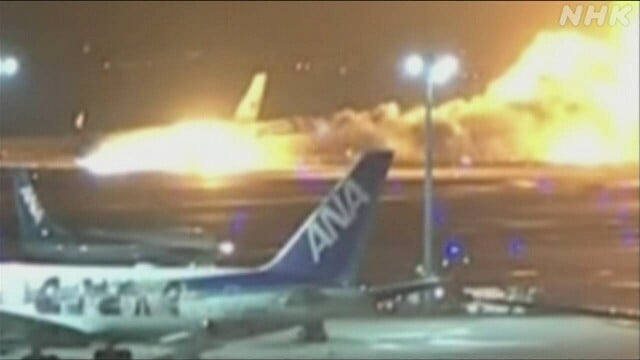
Further insights
These are the aircraft involved:
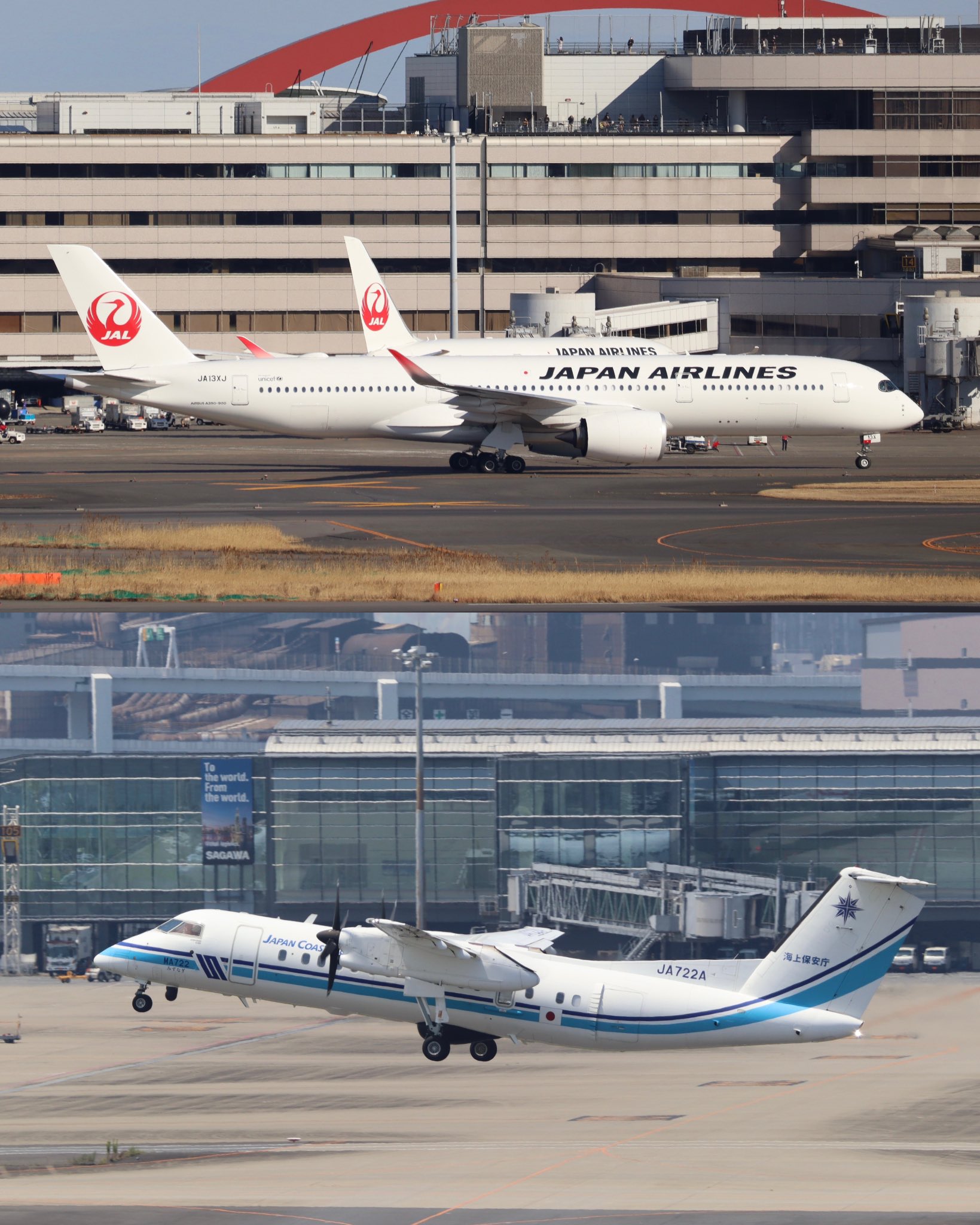
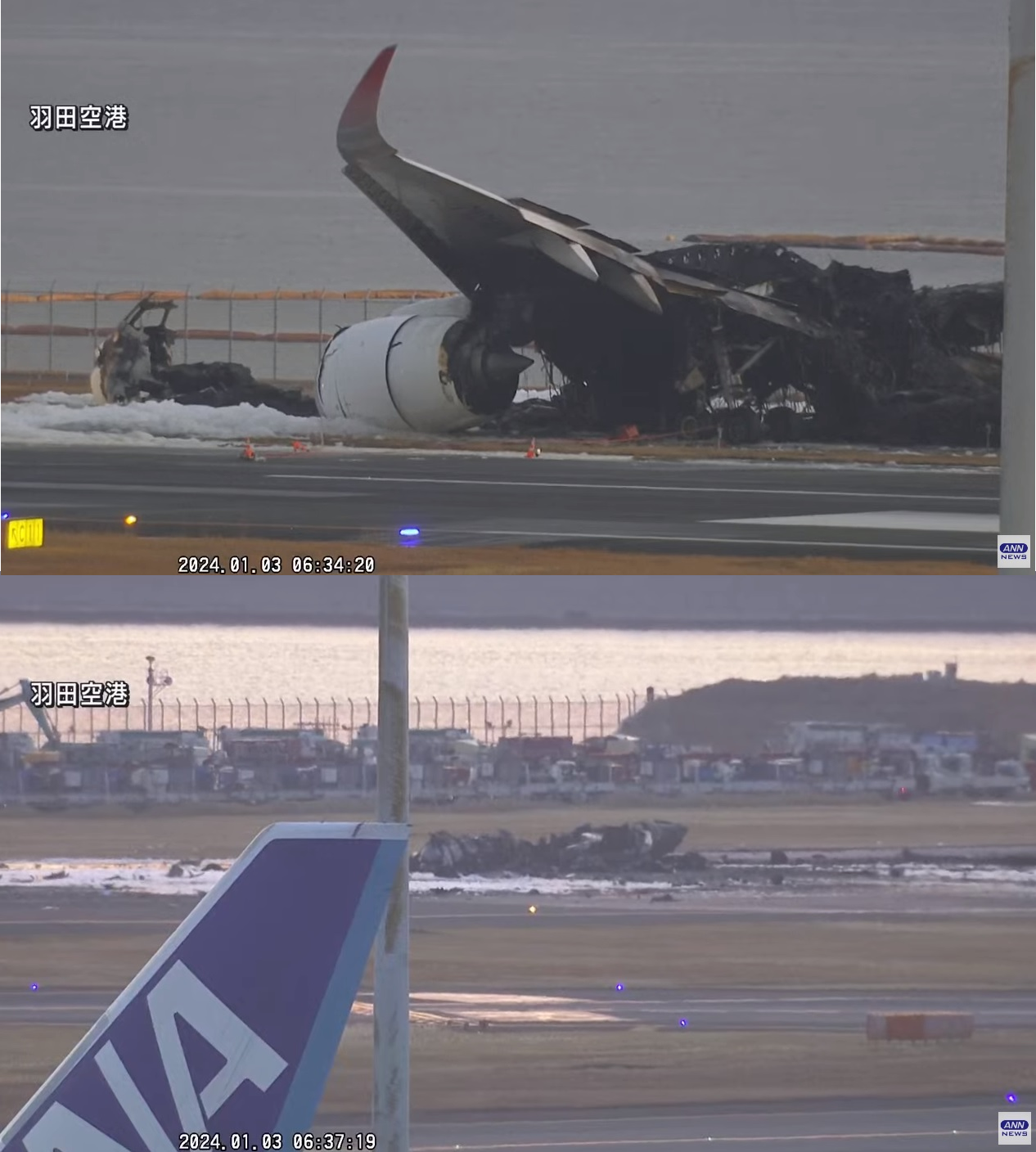
Airbus has issued a statement that a team of Airbus investigators are joining the French BEA, British AAIB and Japanese JTSB. [3]
Japan's Ministry of Transport said on Jan 3rd that JA722A had received instructions to "proceed to a holding point on a taxiway to the runway," [4] noting that the coast guard captain by his own testimony however understood this instruction as takeoff clearance [5], subsequently lining up on runway 34R and setting the stage for the collision. The JTSB is investigating the occurrence.
Tokyo's Metropolitan Police reported they have opened an investigation for professional negligence into the accident.
The JTSB has recovered the voice recorder from the coast guard aircraft. [3]
Minutes after evacuation of JAL516, which completed 18 minutes after touching down [10], the cabin flashed over and the aircraft was reduced to just the engines, wings and parts of the tailplane and nose cone. Daybreak revealed the devastation of the inferno, despite the extinguishing efforts of more than 100 fire engines [2]:
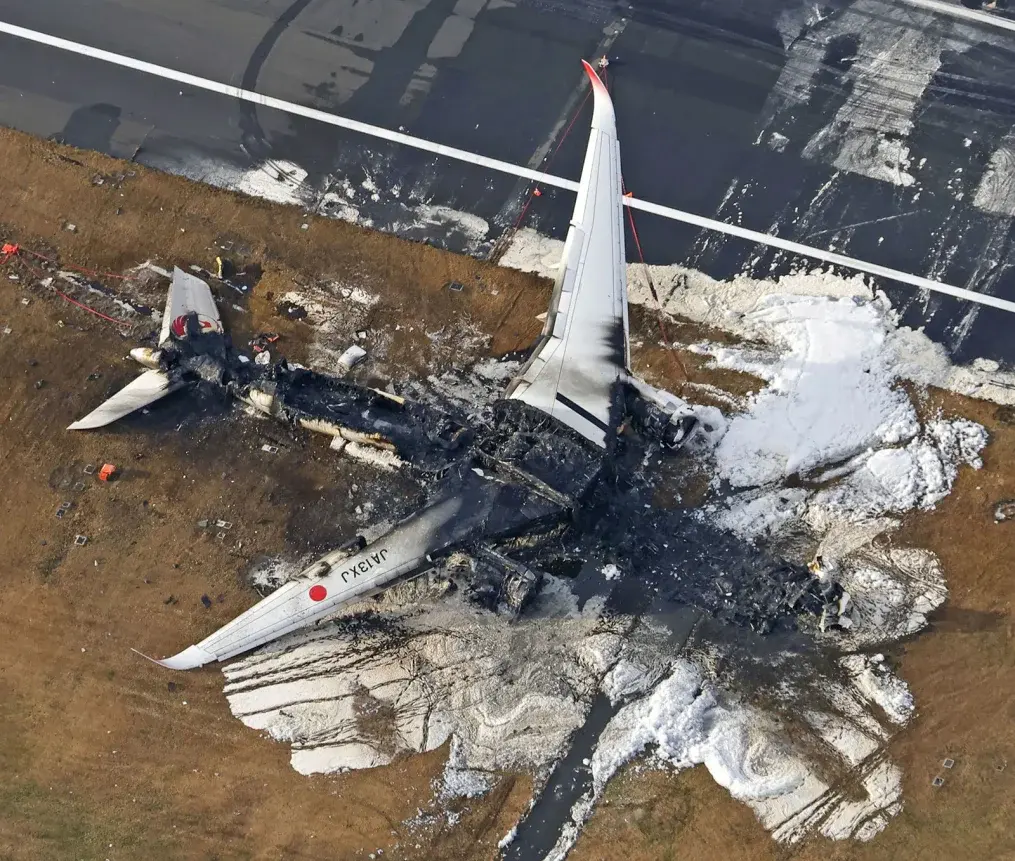
A compounding factor is that the right hand number 2 engine was unable to be shut down and continued to run during the evacuation of the passengers [6], and a video recording shows it spraying sparks that inhibited the use of the rear starboard escape slide.
Videos and photos suggest that of the eight exits, only three slides were used in the evacuation (rear port side and both front exits):
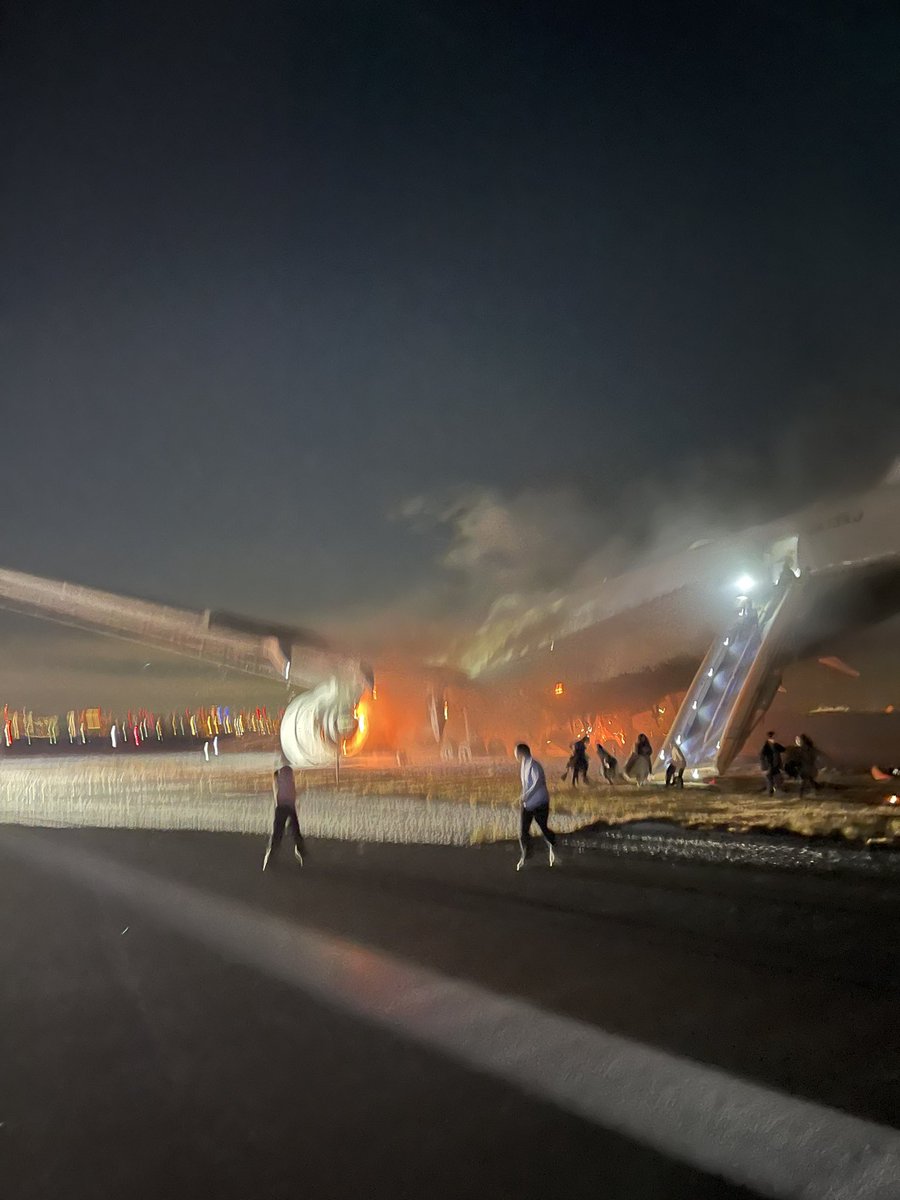
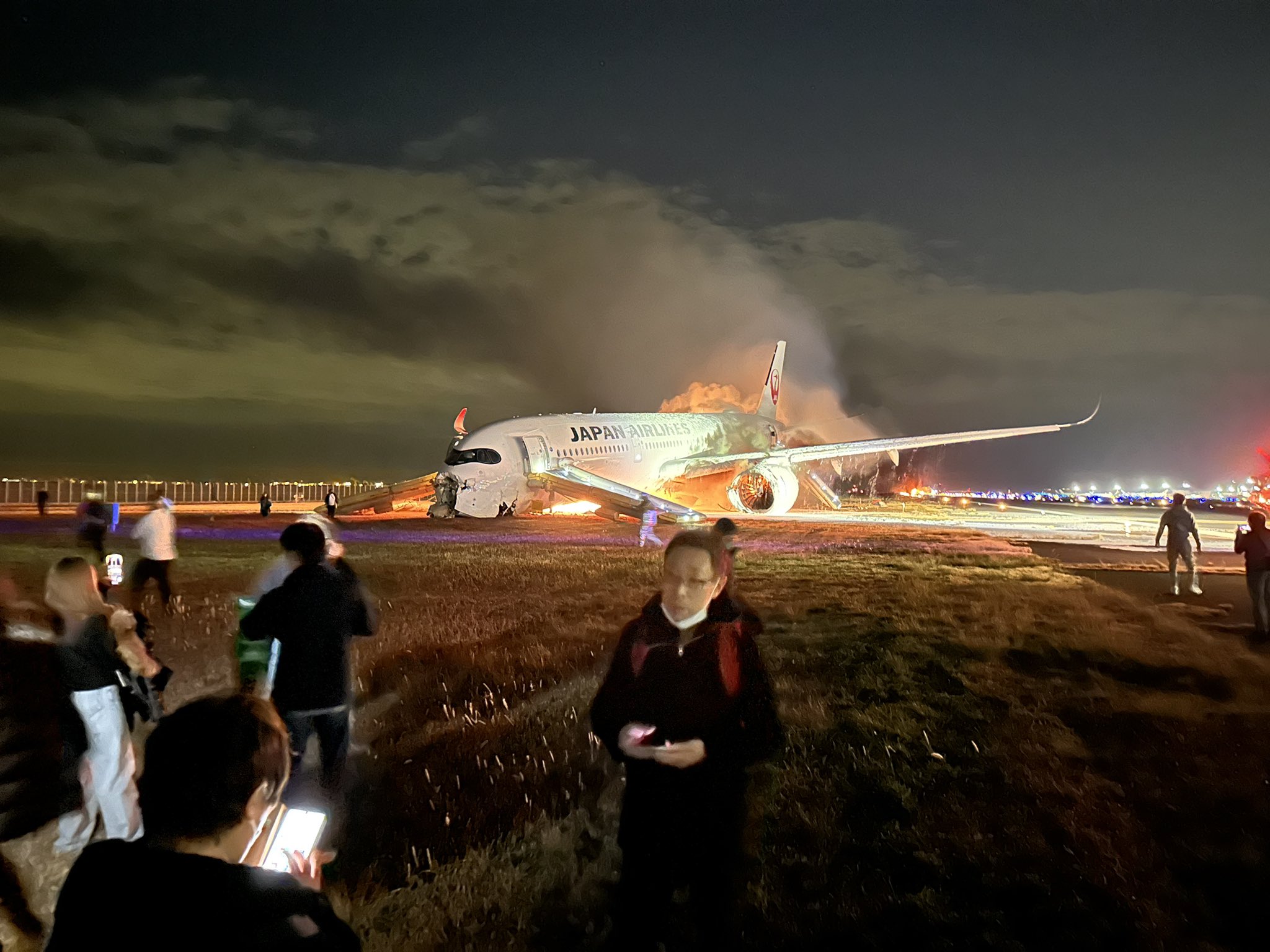
Smoke was present in the cabin during evacuation (longer video) and one passenger stated in an interview that it smelled of "burning chemicals." [2]
This marks the first hull loss of an A350. JAL516 was newly delivered to Japan Airlines in November 2021.
The Dash-8 involved, JA722A, also called under its alternative registration, MA722 "Mizunagi," and was piloted by captain Genki Miyamoto (39), who has been the captain of the same type of aircraft since February 2017 with a total of 4 years, 11 months of experience as a captain and 3,641 fight hours. [14] Miyamoto pulled himself from the wreckage with severe burns and radioed his base, saying, "The aircraft exploded on the runway. I escaped. The [condition of the] other crew members is unknown." [7]
The victims were Nobuyuki Tahara (co-pilot, 41); Yoshiki Ishida (radio operator, 27); Wataru Tatewaki (radar operator, 39); and Makoto Uno (mechanic, 47), and Shigeaki Kato (56), the Coast Guard said in a statement. [14]
A direct impact from behind
Footage from the Tokyo International Airport HND Live Cam clearly shows JA722A enter onto the runway where the collision occurred at intersection C-5 roughly 50 seconds before the accident. The Dash-8's landing light appears to be aligned with the runway in preparation for takeoff. The Airbus had touched down on all wheels shortly prior to impact.
This is further supported by evidence of a direct impact from behind. Nose cone damage on the A350 suggest a direct impact with the Dash-8's aft fuselage or tail section, as evidenced by a user on Twitter by comparing schematics of both aircraft to scale:

Furthermore, the crushed remains of the Dash-8 appears to show relatively less damage to the front of the aircraft:
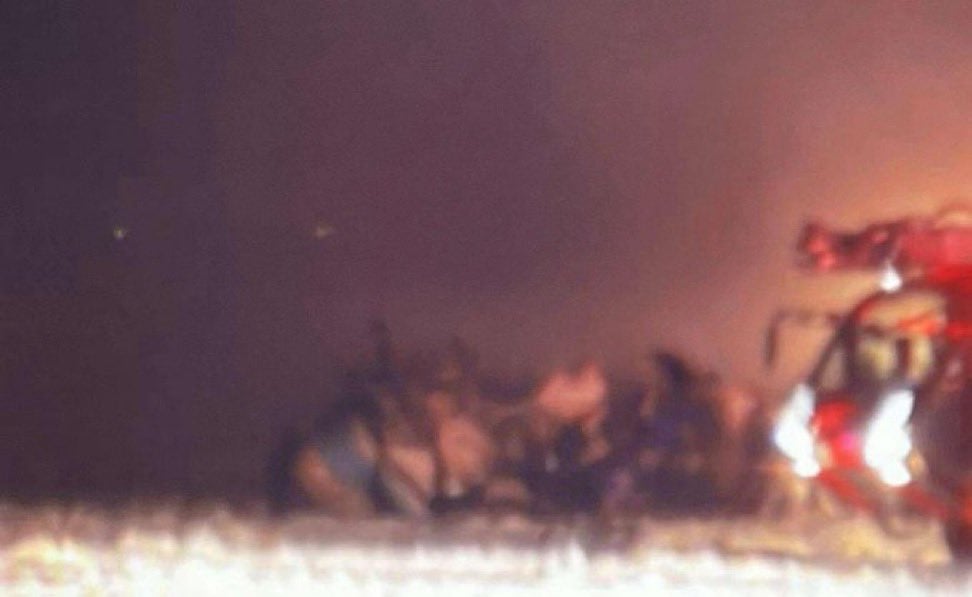
The user goes on to point out the engine cowling damage on both the number 1 and 2 engines, suggesting the Dash-8's wingtips were struck straight or nearly straight on from behind:
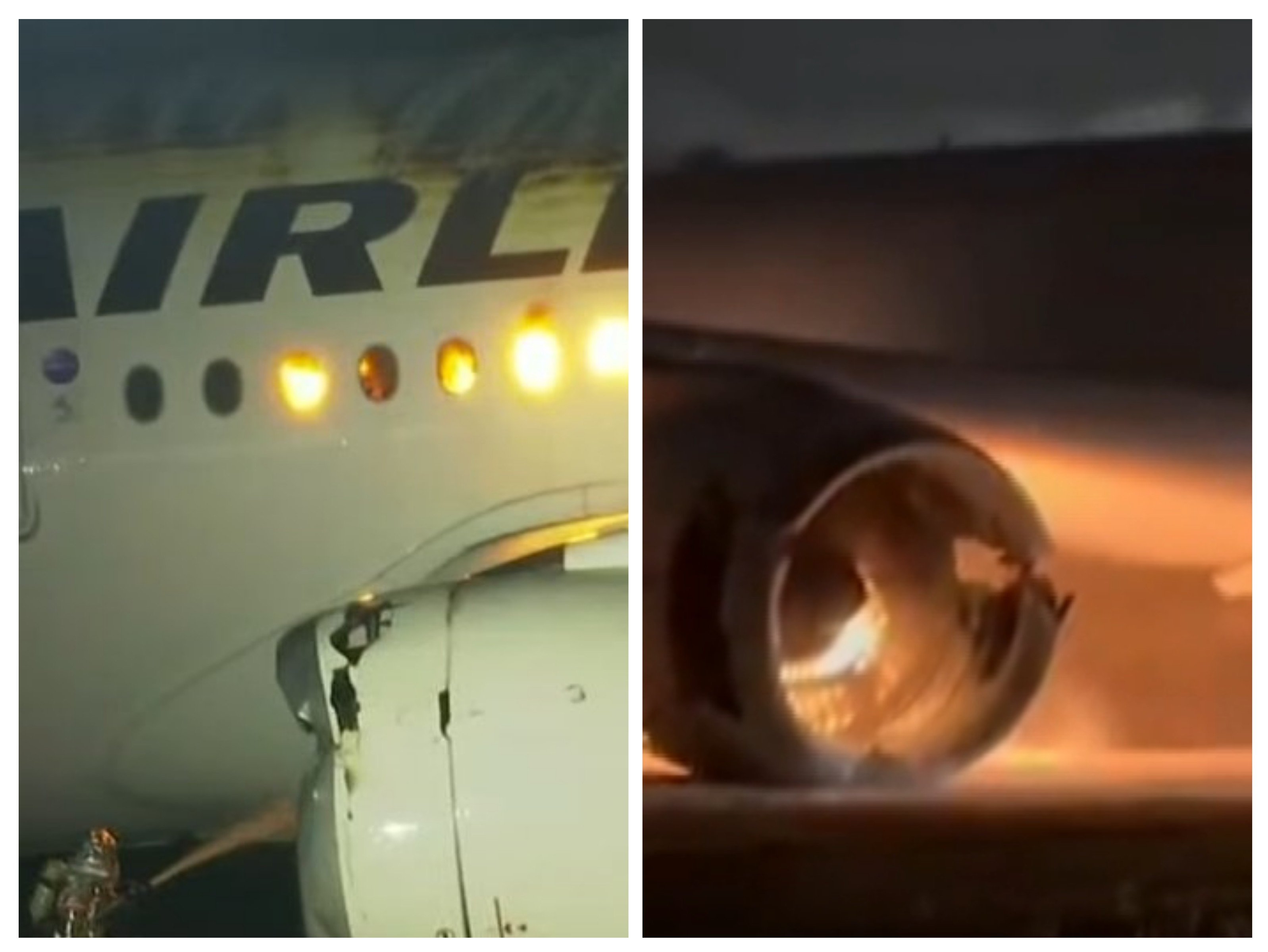
ATC clearances
Japan Airlines said its crew had been cleared to land by air traffic control before the collision. Audio from LiveATC.net (captured in this video) appears to detail the crew reading back a clearance order for runway 34, saying “cleared to land 34 right.” [1]
“According to interviews with the operating crew, they acknowledged and repeated the landing permission from air traffic control, and then proceeded with the approach and landing procedures,” Japan Airlines said. [1]
The ATC communication to JA722A is difficult to understand, but the transcript released to NHK records it as follows [8]:
[ATC] JA722A Tokyo Tower. Good evening. No.1, taxi to holding point C-5.
[JA722A] Taxi to holding point C-5, JA722A No.1. Thank you.
From this point to the collision, ATC was not heard granting permission for JA722A to enter the runway.
While the LiveATC.net recording does not include JA722A reading back the aforementioned ATC instruction, Japan's transport ministry stated on Jan 3 that based on the transcript, air traffic control instructed the coast guard plane to proceed to a holding point on a taxiway to the runway 10 seconds after clearing JAL516 to land on 34R at 5:45 p.m., to which the coast guard plane repeated the instruction. [9]
Editorial notes: (1) There had previously much debate about the transcript, as some listeners heard "C-1" or "C-2" instead of "C-5." (2) The phrasing of this communication is further discussed in the section "Speculation" below.
In response to a question about whether the JA722A had been given permission to enter the runway, the head of the Civil Aviation Bureau of the Ministry of Land, Infrastructure, Transport and Tourism said at a press conference on Jan 2, "We are currently investigating and cannot comment on that at this stage."
How on earth did you reach the conclusion the blog is spam?!
That's not a fair example, because 5 Euros has an intrinsic value. The theft here is of intellectual property. Here's an analogy:
- When you take a book from a book store without paying for it, you are stealing.
- When you take a book from a book store without paying for it, make an exact replication of it and return the original, you are stealing intellectual property.
This grinds my gears. Apple does the same: my work MBP nags me daily to enable iCloud backups but I have no way of doing it because Apple login is disabled by my administrator. Consequently, I cannot reach the settings page to tell Mac to fuck off.
$150k, that'll teach 'em!
Calm down there, sugartits.